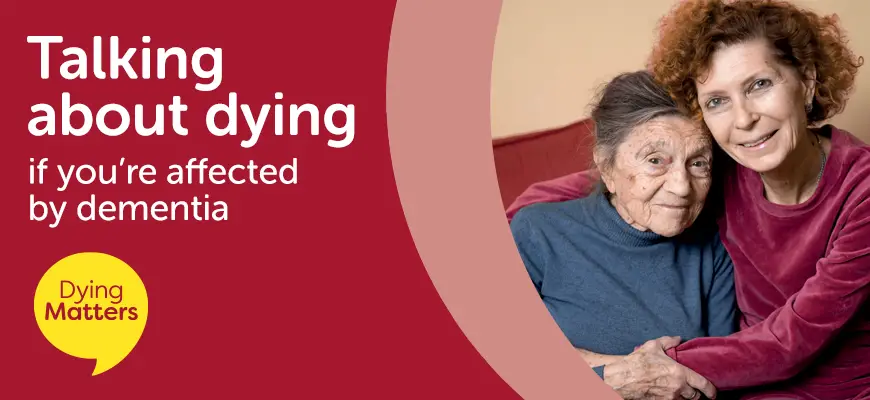
Why it matters
Dementia affects people in lots of different ways, but it often causes memory loss and confusion, and it can make it hard for people to carry out everyday activities. Dementia can be a difficult condition for family and friends to cope with too, as they see changes in people they love.
By putting plans in place for end of life care, you can help a loved one with dementia to live more comfortably in their final days.
We recommend having a conversation about the end of life as early as possible. It reduces anxiety, because everyone knows what to expect. It means you can agree who will take decisions if your loved one is no longer able to. And it makes sure everything is taken care of, reducing stress and hidden costs later on. By talking about dying now, you can bring everyone peace of mind in the future.
What to talk about
Some important things you might want to discuss are:
- Dementia itself – How is it likely to progress, and what will that mean for everyone involved?
- Money – How will you manage finances in the future, and has someone been given lasting power of attorney?
- Making a Will – Is there one in place and is it up to date?
- Where to live – If your loved one needs more help in the future, will they stay at home or move somewhere for more support?
- Future care – Are there types of support that your loved one does or doesn’t want?
- Emergencies – Is everyone clear what to do if the person with dementia has an emergency?
- Practicalities – When your loved one dies, who will do things like phoning others to let them know?
- Planning a funeral – Have plans been made and kept somewhere safe?
- Organ donation – Does your loved one want to donate their organs when they die?
- Life after caring – The future can seem daunting if you have been caring for someone for a long time. Lots of carers and families say their life has felt on hold. Have you put plans in place to help you cope with this change?
When to talk
It can be difficult, but the best time to start talking about dying and putting plans in place is soon after dementia has been diagnosed.
Talking about it won’t bring death closer, but it will give you more time to get everything sorted. Things like organising lasting power of attorney, writing wills and making advance decisions to refuse certain treatments can take time.
Later on, events like anniversaries and birthdays can be a helpful reminder to make sure everything is organised and up to date. And if a loved one begins to need specialist palliative care, that can also be a good time to check through all of the issues mentioned above.
Create a lasting memory. Remember a loved one with Hospice UK
With a gift to Hospice UK, you can remember a loved one whilst helping to ensure everyone gets the care they need at the end of their life.
To celebrate the life of someone who made your life brighter, you can:
- Create a personalised Tribute Page in their memory for free on our website
- Dedicate a leaf on our Tree of Life at Hospice House in London
- Take on a challenge or host an event in memory of your loved one
- Leave a gift in your Will and enable the legacy of someone special to live on
Hospice UK is the national charity for hospice and end of life care. Your support will help us to make sure the right care and support is there for all of us when we need it most.
To find out more, visit hospiceuk.org/support-us or call 020 7520 8266.
Download a pdf of the HospicUK Talking about dying if you’re affected by dementia leaflet

Dying Matters is a campaign run by www.hospiceuk.org



